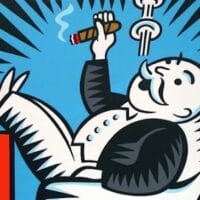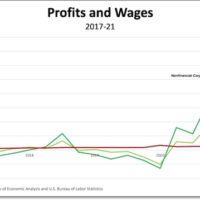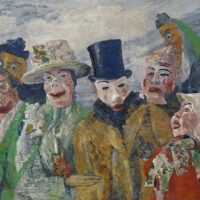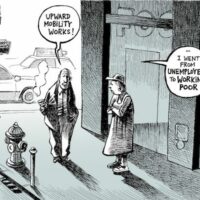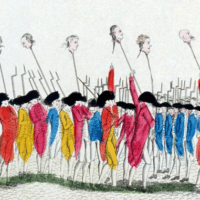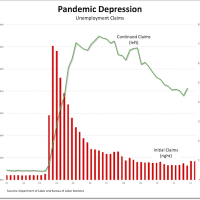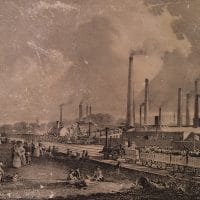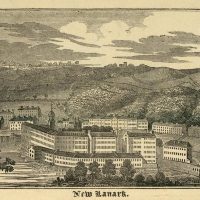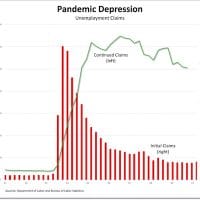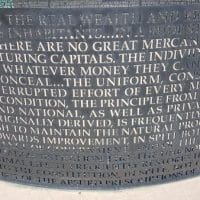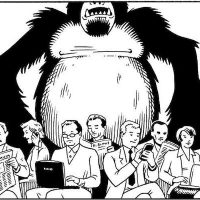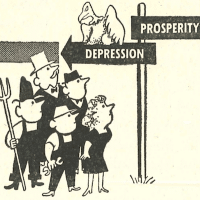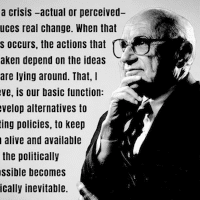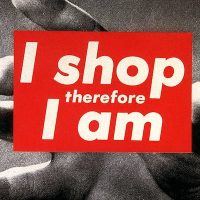-
The world according to Bloomberg
The story currently being peddle by the folks at Bloomberg [ht: ja] is that the American middle-class is currently suffering, as the enormous wealth they managed to accumulate during the past few years is now dwindling. And that crisis—the end of their “once-in-a-generation wealth boom”—is what they will take into the midterm elections.
-
Inflation, wages, and profits
Inflation continues to run hot—and now, finally, the debate about inflation is heating up.
-
Inflation and the case of the missing profits
Everyone knows that inflation in the United States is increasing. Anyone who has read the news, or for that matter has gone shopping lately. Prices are rising at the fastest rate in decades. The Consumer Price Index rose 8.6 percent in March, which is the highest rate of increase since December 1981 (when it was 8.9 percent).
-
Folk economics
Mainstream economists have, it seems, discovered the existence of economic ideas outside the official discipline of economics.
-
How to lie with inequality statistics
It’s a “simple story,” with clear political implications. Maybe that’s the reason the Krugmans of the world don’t want to tell it. . .
-
Ruthless criticism
We can trace the development of Marx’s critique through a variety of texts—many of them now quite famous, even if they are rarely mentioned or discussed within economics. There, we can see Marx’s ideas developing and changing, until he began to work on his critique of political economy, finally presented in Capital.
-
Capitalism and workers’ power
You don’t have to read Marx to understand the lack of power workers have under capitalism.
-
Class conflict and economics
A funny thing happened on the way to the recovery from the Pandemic Depression: class conflict is back at the core of economics.
-
Chart of the day
Both the number of initial unemployment claims for unemployment compensation and the number of continued claims for unemployment compensation are once again on the rise, signaling a worsening of the Pandemic Depression.
-
Toward a critique of political economy
There is no necessary trajectory to Marx’s writings, no reason his earlier writings had to lead to or culminate in Capital. However, as we look back from the vantage point of his critique of political economy, we can see the ways his thinking changed and how the elements of that critique emerged.
-
Age of capital
It was during the “age of capital,” as the illustrious British historian Eric Hobsbawm aptly called it, that Marx formulated his critique of political economy.
-
Utopian socialism
The third major influence on Marx’s critique of political economy (in addition to and combined with classical economics and Hegel’s philosophy) was utopian socialism.
-
Toward a critique of political economy: Hegel
It is difficult to fully understand the Marxian critique of political economy without some understanding of Hegel. No less an authority than Lenin wrote that “it is impossible completely to understand Marx’s Capital, and especially its first chapter, without having thoroughly studied and understood the whole of Hegel’s Logic.”
-
Ruthless criticism
But where did Marx’s critique of mainstream economics come from? It certainly did not emerge in one fell swoop, as a ready-made theory of capitalism. And it wasn’t produced in isolation, independently of the society within which it was first produced and then further elaborated.
-
Chart of the day
U.S. billionaires have recouped all of their wealth—and more—during the Pandemic Depression. Meanwhile, since May, the number of poor Americans has grown by about 8 million.
-
Mainstream economics then: classical political economy
Marxian economists have been quite critical of contemporary mainstream economics. As we saw in Chapter 1, and will continue to explore in the remainder of this book, Marxian economists have challenged the general approach as well as all of the major conclusions of both neoclassical and Keynesian economics.
-
Limits of mainstream economics today
Keynes’s criticisms of neoclassical economics set off a wide-ranging debate that came to define the terms of—and, ultimately, the limits of debate within—mainstream economics.
-
Mainstream economics today: Keynesian
Once it was created as a new theory of capitalism, neoclassical economics expanded its influence—in its original countries as well as elsewhere.
-
Performative economics
The relation between economic theories and economic systems is even more dynamic. The various economic theories of capitalism are not just different ways of making sense of that particular economic system. They emerge, develop, and change over time as capitalism itself changes—and, in turn, they have effects back on capitalism.
-
Mainstream economics today
Readers today will be more familiar with contemporary mainstream economics than with the mainstream economics of Marx’s day. So, let’s start there.


